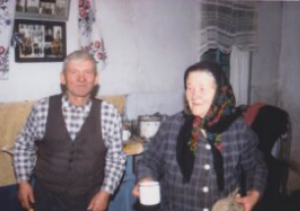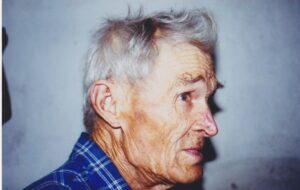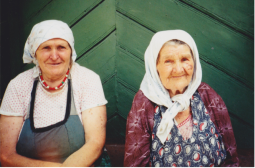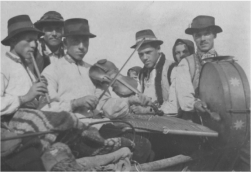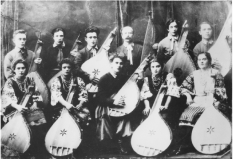—When did people start forgetting the fact that they used to own land?
Mykhailo Pavlovych: They started forgetting this after the war because they were still hoping that things would go back to the way they were. During the war, there were many promises: that there wouldn’t be any kolhospy and there would be a national army. Those were lies to keep the soldiers motivated, and then everything got back to how it was.
—Did the people remember land ownership in the 1930s?
Mykhailo Pavlovych: Of course they did. They were especially forced to remember their own land by the famine. When they had their own land, there was income and no famine.
………………………………………………………………………………………..
—What has changed after the arrival of the kolhospy?
Mykhailo Pavlovych: The kolhospy were established as an order. The skhodky didn’t take place, and the dictatorship was set up. People were taught to raise their hands during those meetings (zbory) because if they didn’t and this was noticed, they would be summoned for a disciplinary action and accused of something they didn’t do, and things would go down hill from there.
—Those administrators were not the wise farmstead owners of the past?
Mykhailo Pavlovych: They were drunks. Maybe in some villages there were respectable administrators, but in our village the head of the village council and the head of the kolhosp were illiterate.
………………………………………………………………………………………..
— What role did the priest play in civil life?
Mykhailo Pavlovych: The priest was second in line after the volost starosta, if not more important. The priest’s orders were the law. People were not as spoiled as they are now to the point of not understanding anything. If anyone did not obey, the priest would say, “What have you done, Yefrem? What did I tell you? It’s a sin.”
— Did the priest own land?
Mykhailo Pavlovych: Yes, he did. The church owned forty desiatyny, and the priest had ten. It was the priest’s field, and the rest belonged to the church. He always had ten naimytiv (hired labor). Perhaps he himself would sometimes go to plow the field. He was not a local. Generally speaking, there were no village priests in Kvitky. First, we had one by the name of Koshets, then – Kostetsky, and this one—Shernyavsky—was repressed. People would turn to him for advice if something was going wrong in their family. Sometimes he would summon people and reform them. People used to go to church back then. Perhaps they would not go every Sunday, but they certainly went on major holidays such as Christmas and Easter. Everybody would go and take part in the sacrament. I was not given food before the church because the priest would treat us to honey. He would scoop some honey with a spoon and give it to us. I was eight years old and lived with my grandfather, and he was very religious. He taught me “Our Father” and told me to recite it ten times before going to bed. Grandfather was simple: he didn’t use any featherbeds or mattresses¾he would just spread his sackcloth on the floor. I would always sleep on the stove, and he¾on the stove ledge. It was warm. The food was simple: potatoes, cabbage, cucumbers, and cheese. On Sundays we had meat in our borsht or we had a meat stew and kasha, especially millet porridge.
………………………………………………………………………………………..
—Was there a church in the village?
Mykhailo Pavlovych: Yes, and it was beautiful. There was a khram to honor the autumn Mykola [Saint Nicholas Day celebrated on 19 December]. The church was made of wood in 1857. This was the third church in Kvitky.
—How many were there?
Mykhailo Pavlovych: Three. The Cossack church was in the center of the village. It fell apart by itself. Our village is very old, dating to the fifteenth century. There are many ponds, five water mills, and sixteen windmills. The other church was old, from 1857. Everything here used to be covered with woods with a few clearings here and there.
—Any kyrgany (tumuli)?
Mykhailo Pavlovych: There’s one near the quarry; it’s marked with a cross.
—Is there no church now?
Mykhailo Pavlovych: The building exists, but it’s not set up as a church, and there’s no cross. The head physician built his house there. Then they wanted to turn it into a local history museum—the area with a Haidamatsky oak tree [a local name the meaning of which is unknown to me] and other oaks; artists from Kyiv came. Our community wrote a letter to Kyiv, and the decree was to allocate this land to a church [recent history].
………………………………………………………………………………………..
—Did you go singing shchedrivky and koliadky before collectivization?
Mykhailo Pavlovych: Saint Andrew’s Day [December 13], Malanka, shchedrivky, and koliadky—the boys would go singing and the adults carried a star around. They would walk into houses and get treats.
—Was this after the 1930s?
Mykhailo Pavlovych: When the kolhosp began, all this was persecuted, erased, and banned. Atheist propaganda was strong. You know, people learned to be bootlickers and didn’t protest. People were scared and did what they were told to avoid persecution.
………………………………………………………………………………………..
—Did people play musical instruments?
Mykhailo Pavlovych: Harmonia, bubon, and fiddle were the main instruments. They played at weddings. My father was a harmonia player, and he used to earn over six hundred kilograms of grain. He was also invited to other villages. He played very well.
………………………………………………………………………………………..
—Did anyone sing anti-Soviet songs at the time?
Mykhailo Pavlovych: There were some like “Comrade Voroshylov, the war is coming, but Budionnyi’s horses were turned into sausage” (this rhymes in the Ukrainian: “Tovarishch Voroshylov, voina ved na nosu, a konnitsa Budionnoho pishla na kolbasu”); or “There’s no bread and no lard—agricultural procurement contracts took everything” (“Nema khliba, nema sala: kontraktatsia zabrala”). There was another song: “Here we are: no cow, no pig, but we have Stalin’s portrait on the wall” (this rhymes nicely in the Ukrainian: “Dozhylysia yakos my: ni korovy, ni svyni, tilky Stalin na stini”). There were many jokes about Stalin. If I knew someone well, I’d tell them such a joke; if not, I wouldn’t. In 1934, the workers were in the field: “Did you guys hear the news? Kirov was killed.” — Makar Shevchenko said, “Only Kirov?” That’s all he said, and to this day no one can find him. Back then, there were many policemen. They divided the people.
………………………………………………………………………………………..
—Would you like it if your father’s farmstead were given back to you?
Mykhailo Pavlovych: We’re moving toward land repossession; it cannot be otherwise. People got to the point where they don’t want to work. How can you get any results that way? One worked for himself but also for society, this much I know. If there were any extra products, they would be sold at the market. What was done during NEP, tell me? After the civil war there was nothing; everything was ruined, burned, and destroyed. During the three years of NEP everything was restored. People worked hard. We had about five smithies: people made plows and hayforks—all that was necessary.
